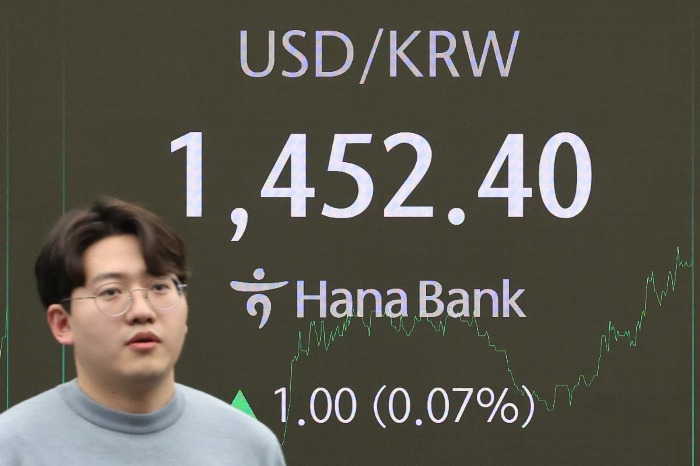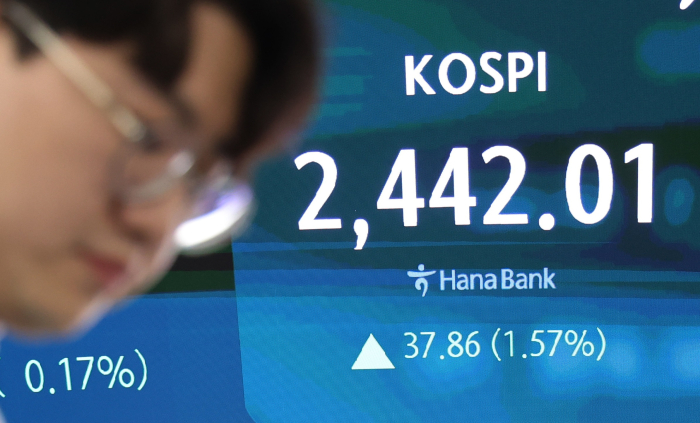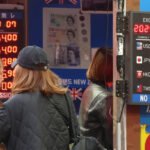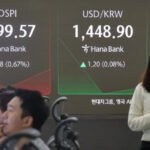
South Korea will raise the limits on forward dollar purchases and expand the foreign exchange swap line between the National Pension Service (NPS) and the Bank of Korea by the end of this month, said Choi Sang-mok, deputy prime minister and minister of economy and finance on Monday.
Under the measures, domestic and foreign banks will be allowed to increase dollar buying on the forward market to 75% and 375% against their equity capital, respectively. Currently, their forward dollar purchases are restricted to 50% and 250%.
The move, aimed at supporting the Korean won, came a day after the currency sank to its weakest level in more than 15 years against the dollar on Thursday. It fell to 1,453.0 per dollar on Thursday, marking its weakest since March 16, 2009.
An increase in forward dollar purchase limits will likely lead to a rise in their dollar selling on the spot market for hedging trade.
As for the NPS, the increased forex swap line will reduce its dollar buying as the national pension scheme is able to secure more dollars from the central bank for overseas investments.
“We will shortly implement measures such as increasing the limits on foreign exchange forward trade and the forex swap line with the National Pension Service by the end of this month,” Choi said at a briefing after a meeting with financial regulators to discuss macroeconomic and financial market conditions.
Bank of Korea Governor Rhee Chang-yong, Financial Services Commission Chairman Kim Byung-hwan and Financial Supervisory Service Governor Lee Bok-hyun attended the gathering.
Choi warned of growing market volatility in the short term and stressed the authorities will closely monitor domestic financial and foreign exchange markets 24 hours a day.
“If needed, we are fully ready to respond in order to stabilize the market,” he added.
Last week, the US Federal Reserve’s hint at fewer interest rate cuts in 2025 pummeled South Korean stocks and won currency already reeling from political uncertainties after President Yoon Suk Yeol was impeached on Dec. 14 after a failed martial law attempt.

VALUE-UP FUND
The finance minister also said the government will inject an additional 300 billion won ($206 million) into the domestic stock market in the immediate future via the second Value-Up Fund.
The fund recently raised 300 billion won in commitments from the Korea Exchange and four other securities market-related institutions such as Korea Securities Depository and Korea Securities Finance.
The fund will invest in Value-Up Exchange Traded Funds (ETFs) and stocks included in the value-up index.
The Korea Exchange launched 12 Value-Up ETFs tracking the Korea Value-Up Index in November 2024. The index tracks 100 outperforming South Korean companies chosen in terms of market capitalization, trade value, profitability, shareholder returns and capital efficiency.
REPURCHASE AGREEMENTS
If the domestic financial markets stumble again, the Bank of Korea will provide an additional liquidity through repurchase agreements. Since Dec. 4, the day when Yoon’s martial law was repealed by Parliament, the central bank has bought 19.6 trillion won worth of repos.
Repos are short-term agreements to sell securities and repurchase them later at slightly higher prices. They are typically used to raise short-term capital.
Also, the government will allow banks to increase foreign currency lending to domestic companies, both large and small-sized, for facility spending from next month.
The country has put a tight cap on forex lending to small and medium-sized enterprises to constrain their foreign debt growth.
By Yeonhee Kim
yhkim@hankyung.com
Jennifer Nicholson-Breen edited this article.















